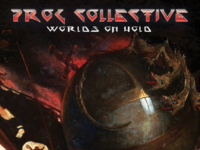Plenty of rock bands went through rapid lineup changes, ultimately breaking apart over “artistic differences.” That’s essentially the narrative of the short-lived prog supergroup UK, which existed from 1977-80. Plenty of uber-talented musicians with big egos managed to make one or two stand-out albums before splintering under the weight of expectations. That, too, happened with UK.
What didn’t happen for UK is a journey toward the mythical status typically accorded to such groups, that moment where people realize lightning was caught in a bottle – but only after it was released again never to return. Somehow, UK’s standout sophomore effort Danger Money, released this month in 1979, remains largely unheralded – even though it stands now as a classic of the progressive rock genre.
UK originally coalesced when ex-Yes and King Crimson drummer Bill Bruford and ex-King Crimson bassist/lead singer John Wetton invited guitarist Allan Holdsworth and keyboardist/electric violinist Eddie Jobson to join them in a supergroup of sorts. They made a self-titled debut as UK in 1978, toured as Jethro Tull’s opening act but then Holdsworth and Bruford left to form a separate group led by Bruford. Allan Holdsworth wasn’t replaced, but Eddie Jobson brought in fellow Frank Zappa alumnus Terry Bozzio on the drums, and UK was re-christened as a power trio.
Danger Money, which arrived the next year, somehow reached my ears then on the strength of their made-for-radio single “Nothing too Lose.” I went and got Danger Money, and found that the rest of the record wasn’t quite as radio-ready, but it dazzled more. This has many of the earmarks of a stereotypical prog-rock record: heavy-handed musicianship, oddball and shuffling time signatures, extended pieces and songs about weird or abstract topics. But UK was exceptionally tight, and the songwriting team of John Wetton and Eddie Jobson produced tracks that had just enough hooks to linger in your brain, but were unpredictable enough to keep you coming back to the songs to figure out what you missed the prior time.
UK’s Danger Money featured three songs a piece on each side of the platter – a trio of shorter (five minutes or less) songs and three which were eight minutes or longer. Most probably that reflected a compromise between John Wetton and Eddie Jobson, who afterwards broke up the band over a disagreement about how long the songs should run.
The title track opens up the record, and Jobson’s advanced mastery of keyboard textures comes into focus right off on a bombastic, death-march intro. Eddie Jobson’s big organ sound interwoven completely with a synth in a grand, bombastic piece that fades away cleanly to make way for the quicker paced main body of the song. John Wetton sings a first-hand narrative of a hit man’s life with dry wit: “It’s one hell of a lifestyle, but then it brings in the pay”; “I can show you no mercy – well, they don’t pay me for that.”
“Danger Money” signifies what UK Mk II was about: more straightforward melodies with some real verse and refrains folded in with tricky instrumental passages and quirky structure change-ups. And though Wetton is plenty proven as a vocalist and bass player, this band had become a vehicle for its remaining true virtuoso in Eddie Jobson.
“Rendezvous 6:02” points further into a pop direction, resting gently on a bed of Jobson’s acoustic-sounding electric piano, playing in a jazzy vein during the instrumental section and competing against increasingly bigger cascades of synths. “The Only Thing She Needs” is Terry Bozzio’s showcase, with a solo near the beginning and death-defying fills galore.
Though Bozzio wasn’t yet in Bill Bruford’s league, he was already plenty good enough to handle the chores. “Caeser’s Palace Blues” could have been a vocal track on Jean-Luc Ponty’s Cosmic Messenger, with Jobson’s demonic electric violin alternately sounding like a champion fiddler and a heavy metal guitarist.
“Nothing to Lose,” in retrospect, pointed the way to the more digestible form of prog that John Wetton preferred – providing the formula for his next band, Asia. “Carrying No Cross” is that obligatory epic that you find in every good progressive rock album, the kind that hard-core prog-heads prefer.
With a temperament that ebbs and flows meticulously like a symphonic piece, token vocals and a frenzy of almost everything in Jobson’s arsenal in the solo-laden middle section – synthesizers, organ and, yes, even acoustic piano – this was clearly constructed as a crowd pleaser. At more than 12 minutes long, they let it all hang out. If you want to know why Eddie Jobson is considered such a keyboard wizard, this is the song to head to first.
Alas, Danger Money effectively marked the end of the classic prog rock period. Aside from a live record released the following year after the group disbanded, this was it for UK, too. After that point, it seemed most of the major participants in the decade of prog rock’s golden era moved on to more commercial realms: Yes reformed around Trevor Rabin with simpler, shorter, radio-ready songs. Genesis continued a transformation to a pop-rock band that was complete by 1983, and Asia was formed with Wetton and Yes guitarist Steve Howe around the same time. Missing Persons, Bozzio’s band with his wife Dale, fully embraced synth-pop.
Jobson, meanwhile, kept a lower profile, releasing a couple of solo albums but working as a session player for other bands like Jethro Tull or Spyro Gyra. A comeback for prog started in the 1990s, and it is, in a way, testament to the enduring music of its best acts – acts like this one. Though short-lived, UK did its part to make a case for the form of rock that’s hardest to master.
Occasional reunions followed; let’s hope recognition one day does too.




Jobson is a virtuoso, but really Wetton is, too. He rivals and beats Bryan Ferry for looks. Beautiful voice and right on bass.
But, by Danger Money, all three were pretty good-looking guys, which helped.
God bless John Wetton as he fights cancer.